As I said in my Haikyuu!! review, I have lots of thoughts about how the series deals with masculinity and how Furudate writes female characters. Shonen manga is aimed at teenage boys, which is why I think it’s so important that these series provide positive role models for their audience, something that is unfortunately rare. I’ve grown used to Shonen mangakas reinforcing outdated gender roles and misogyny, so I was pleasantly surprised when Furudate proved that you can write a story where 90% of the cast is male and somehow not be sexist. Haikyuu!! avoids sexists tropes at every turn and gives the audience a beautiful example of positive masculinity, so today I want to talk about this aspect of the series, which I think deserves a lot of praise.
Avoiding Sexist Tropes.
We are all familiar with the “pervy guy” character. Roshi from Dragon Ball, Jiraiya from Naruto, Netero from Hunter x Hunter, Sanji from One Piece, Mineta from My Hero Academia, Zenitsu from Demon Slayer, etc. They all have one thing in common: They are pigs. They always think about sex, they objectify women, and sometimes they commit borderline assault. I hate them1. However, Shōnen mangakas adore this trope, so we are forced to see it everywhere.
Enter, Tanaka and Nishinoya.
Here’s the thing about these two. They are teenagers and they like girls, but they are normal about it. Sure, they are always proclaiming their undying love for Kiyoko, but they never overstep. Tanaka and Nishinoya respect Kiyoko and girls in general, and they never act creepy towards them. If anything, they lean a little too hard into the chivalrous attitude, and they can be overbearing in their desire to “protect” Kiyoko from other boys2. I’m going to talk about two specific scenes that I think sum up how these two characters are different from the other “woman lovers” of shōnen.
Before the first day of Nationals, the Karasuno team goes to their hotel and the girls go take a bath. Now, in any other series, this would be when Tanaka and Nishinoya would come up with a plan to peek into the girls’ bath and watch them naked. I’m too used to shōnen at this point. What happened instead is that, while Tanaka and Nishinoya did think about the girls bathing (because they are, again, teenage boys), they never even suggest watching them bathe, they just sigh and move on. Wow, that’s allowed? Tanaka tries to listen in on the girls’ conversation from outside the bathroom, but that’s it. This is the bare minimum, and yet! I was so happy that the dreaded bathroom scene didn’t happen.
The other scene involves Nishinoya, and it lampshades a popular pervy trope in shōnen. At the stadium, Nishinoya trips and almost falls into a girl’s chest, and while he’s falling he thinks that he’s finally going to have an “accidental pervy moment” and apologizes to the girl in his mind, but right before it happens she stops his fall and the scene moves on. Tanaka comes in and turns out that he knows the girl, and he’s a teenage boy with hormones, so he does notice her chest, but he doesn’t act creepy towards her. Wow. Did you know you can write about hormonal teenage boys without sexualizing young girls?
There are plenty of other instances I could point out, but these are my favorite examples of Haikyuu going against the common sense of the genre.
Also, and this is also going to sound like I’m giving Furudate a medal for the bare minimum, but I was so glad that there was never a perverted old man. Not a single adult ever makes a pass at any of the teenage girls. I was so scared that Ukai was going to fall into the “roguish bachelor that flirts with High School girls” archetype, I’m so sorry that I doubted my GOAT!
The Female Cast.
I love the girls in this series so much. In general, I like that they aren’t sexualized and that they are designed to look their age and dressed appropriately. The girls have their own personality, and they aren’t forced into the “love interest” box, they have meaningful relationships with other women and they get their own arcs. There aren’t that many female characters (this show is about the male volleyball team, after all), so I will be going over each of them.
First, let’s look at Kiyoko, the main female character and Karasuno’s manager. Kiyoko is initially reserved and closed off, but it’s made clear that she has an special place in the team and her support means a lot to them. Even though she’s introduced as a “pretty girl”, she’s much more than that. She starts to open up more after the introduction of Yachi, the other main girl of the series, and their friendship allows us to get to know more about Kiyoko and her motivation to join the team. I loved finding out that she was an athlete herself who wasn’t able to continue practicing her sport due to an injury, and that the volleyball team reignited her passion for sports and gave her something new to work hard for. Volleyball became as important to her as it is to the others, and she deeply believes in her teammates just like they have faith in her. Kiyoko’s story is as powerfull and well written as any other.
Karasuno’s other manager, Yachi, is one of the funniest characters in the series. Her overthinking and nervousness pair well with Kiyoko’s calm demeanor3, and she often provides comedic relief. I like that she gets an arc about gaining confidence in herself and falling in love with volleyball, even though she stops being the focus after her introduction she still gets a lot of character development, and you can see her grow into her role as Karasuno’s manager as the series progresses. The conflict with her mother was very interesting, and it’s nice to see a story about a working single mother struggling to understand her daughter. I like that Yachi forms a genuine friendship with the boys at the club, without any romantic undertones, and that she’s included in the boys’ antics.
Saeko is Tanaka’s older sister, she’s wild and a little crazy and I love her. She often comes in clutch when Karasuno is in trouble, like taking Kageyama and Hinata to the training camp (almost killing them on the way thanks to her insane driving), and bringing her taiko team to cheer Karasuno on during Nationals. Saeko doesn’t understand a lot about volleyball, but she’s there to support her little brother, and she ends up learning about the sport in order to follow the matches better. There are a couple other sister characters in the series, but Saeko is the most relevant as the leader of Karasuno’s cheering squad.
I’m personally fond of Johzenji’s manager, Hana. She has a very short presence in the story, but she still had her own moment, which goes to show how much Furudate cares about fleshing out even the most minor characters. Hana’s passion for volleyball and her commitment to her team were admirable, and the scene of the boys showing their appreciation to her after the match was very sweet.
There are two more girls that I want to talk about, Michimiya and Kanoka. Michimiya is the captain of Karasuno’s female volleyball team, and she clearly has a crush on Daichi, the captain of the boys’ team. Kanoka is a spiker for another school, and she is Tanaka’s childhood friend, for whom she has romantic feelings.
Michimiya doesn’t get a lot of development, but her struggle to be a good captain and her grief after losing are given just enough time to tell a compelling story. One of the main themes of the show is that losing isn’t the end, but that doesn’t mean that it stops hurting. I like that she has more to her than just being a girl with a crush, even if she isn’t important to the main plot. Michimiya and Daichi never explicitly get together, which I think is a better ending for her character.
Kanoka’s time on the story is even more reduced and her feelings for Tanaka are the main focus of her arc, however, her reasons for liking him are properly developed. Tanaka is a source of inspiration for her, he got her into volleyball and defended her from bullies. Kanoka is motivated by Tanaka and doesn’t let his rejection slow her down—in fact, we later find out that she became a professional volleyball player, and she even got into Japan’s national team.
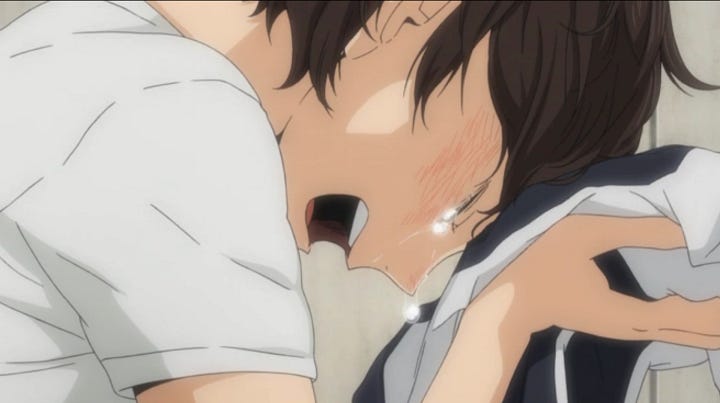
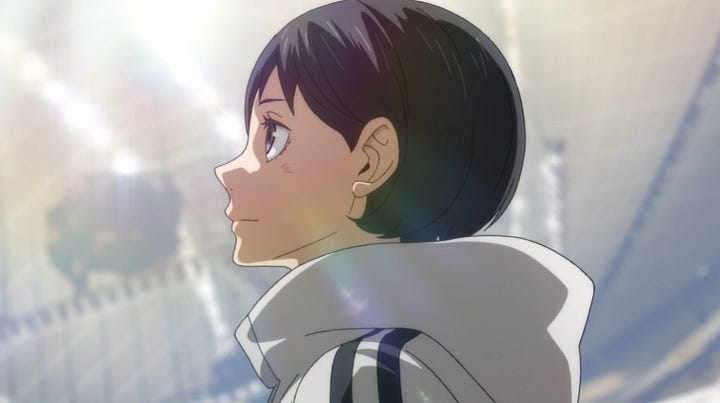
Romance That Works and Why.
There is very little romance in Haikyuu, something that works in its favor. Shonen authors aren’t the best when it comes to romance4, and that is a direct result of them not treating women as equals to the men they are supposed to fall in love with, which makes the relationships feel forced. However, Furudate doesn’t include romance unless it works for the story and the characters, and when he writes a romantic couple, he does it well.
My favorite Haikyuu couple are Heitor and Nice. Heitor is Hinata’s partner when he’s playing beach volleyball in Brasil, and Nice is his girlfriend. The pair doesn’t get a lot of page time, but it’s made clear that they have a strong partnership, and they deeply love one another. Heitor’s love for his girlfriend isn’t ridiculed, he’s allowed to show his feelings for her, and the climax of the Brasil arc revolves around Heitor wanting to win a tournament so he can propose to Nice. What makes this even better is that Heitor doesn’t win, but Nice proposes to him after delivering a beautiful speech about how much she admires him. It’s extremely rare to see a woman proposing to a man in media, and the scene isn’t about Heitor feeling emasculated or ashamed, it’s an earnest celebration of their love, and it shows to young boys that it’s okay to be romantic and cherish their significant other. That’s great! The scene is a perfect ending to the Brasil arc, it’s a sweet farewell to these characters, and it shows how much Hinata has grown to care for both Heitor and Nice. It also ties into the themes of the series, because Haikyuu constantly reminds the audience that winning or losing isn’t the point, that life doesn’t always go as planned, and that it’s important to show people how much they mean to you. That’s how you write a good romance!
There’s only one other couple worth talking about5, Tanaka and Kiyoko. I’ve seen some criticisms of this couple, the main argument being that Kiyoko never reciprocated Tanaka’s feelings and that them ending up together is just a way to “reward” Tanaka for his persistence.While I think Furudate could have added more scenes of Kiyoko showing interest in Tanaka, I think the claim that Tanaka is essentially a nice guy that got the girl in the end is overtly simplistic and a bad faith reading. As I mentioned before, Tanaka treats Kiyoko with respect and shows multiple times that his feelings for her aren’t shallow, he genuinely admires and loves her. I think the scene of these two together after the Nationals, despite being a very small moment, sets up their future relationship well enough. It’s a quiet and sweet interaction where Tanaka stops acting so overbearing and understands Kiyoko’s feelings about their loss, and because he isn’t being so over the top Kiyoko finally accepts his help, which shows that these two are teammates before anything else. I think Tanaka and Kiyoko compliment each other well, and it isn’t unrealistic for these two to grow closer after High School, specially considering how deep Tanaka’s feelings for her go. The only thing that is unrealistic to me is that they got married so young, I would have preferred them to be dating or maybe engaged, but that’s just a nitpick.
The reason that romance works in Haikyuu is that we get to see the women’s side, and love isn’t treated as “girly” or “lame”, the boys in the series are allowed to be as invested in their relationship as their girlfriends and to express their feelings openly. That brings us to my next point…
Emotional Intelligence and Positive Role Models.
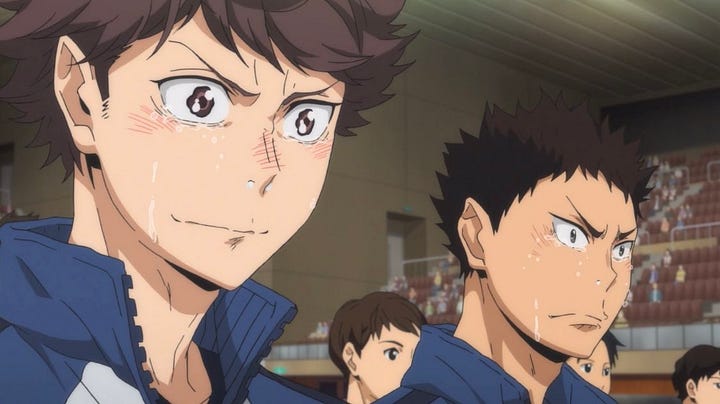
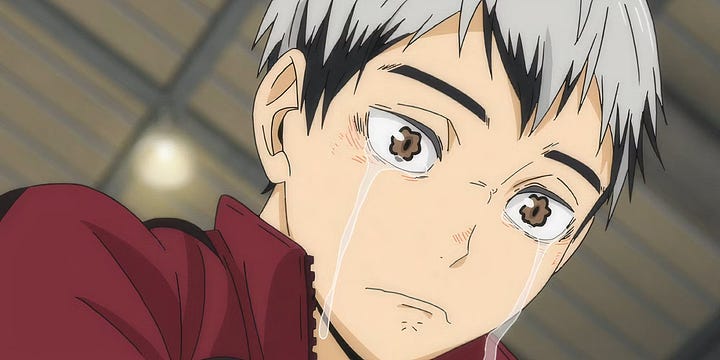
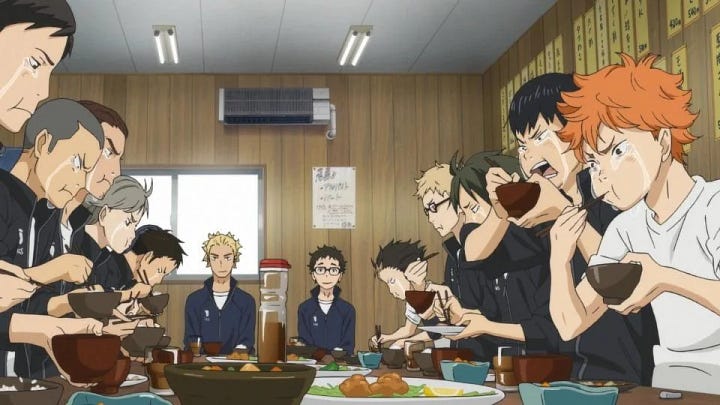
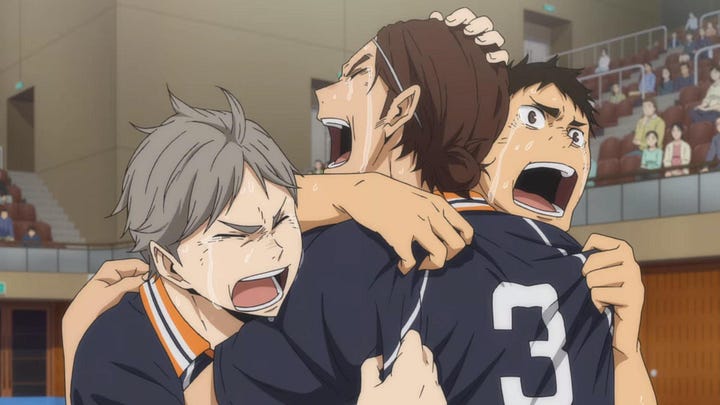
One of the things that I love about Haikyuu is how the series teaches positive masculinity, which I think is really important considering who the target audience is.
The boys in this series are sensitive and emotional, they are able to express their feelings without shame and to show how much they care for their friends and loved ones. The power of friendship is a common theme in this kind of story, but Furudate pays special attention to write healthy and open relationships between the boys, they encourage and support each other, and they aren’t afraid to voice their love for their friends. Good sportsmanship is also a key element of the series, the rivalry between the characters is built on mutual respect and love for the game. The boys are also allowed to be friends with girls and to have meaningful bonds with no romance involved. It’s also nice that the adults encourage the children to cry when they feel sad, it’s important for boys to know that they can cry too.
Treating women with respect is also something that Furudate takes care to teach with his manga. Hinata trains with girls and women multiple times, the managers are treated as part of the team, and the girls are never objectified by the men. A scene that I really like happens in season 2, when Karasuno is going to play against Johzenji, a team of wild and carefree boys. Before their match, Hinata meets a few of the Johzenji students when they are harassing Kiyoko and trying to get her number. Hinata looks around for help and realizing there isn’t anyone else, he intervenes and makes the other boys back off. This is a nice scene for young boys to learn from, even if it can be seen as Kiyoko being treated as a damsel in distress. I also like that Hinata is the one to do this, because unlike Tanaka and Nishinoya, he isn’t romantically interested in Kiyoko and therefore his actions can’t be seen as being motivated by his own feelings for her, he’s just helping out a friend.
Most of the characters have an older figure that they are able to look up to and that was there for them when they needed it, someone that taught them the skills to become the best version of themselves. Ukai and Takeda teach Hinata the importance of taking care of his body and mind, and taking every opportunity he gets to improve. Ukai Sr. and Nekomata inspired their students to love the game and to build healthy rivalries. Tsuki’s older brother Akiteru showed him that doing something you love and being proud of it is more important than being great. Kageyama’s grandpa encouraged his passion for volleyball without putting pressure on him. Hinata’s coming of age is all about learning emotional intelligence and how to take care of himself, and it’s all thanks to these wonderful role models he has in his life to guide him and the other boys in their journey.
The ideal masculinity of Haikyuu is all about camaraderie, good sportsmanship, emotional intelligence, and respecting others. I think that’s beautiful.
While I would never claim Haikyuu!! is a feminist masterpiece (nor should it be), I think we must recognize Furudate’s effort in writing good female characters and treating them as people with their own interiority. Not only that, but the series also sets a good example for the young boys that are ultimately the target audience. Maybe the bar is on the ground, but seeing as few series clear that bar, I think it’s fair to celebrate Haikyuu!! for doing a little more than the bare minimum.
Thanks for reading! If you enjoy what I do but are not ready to become a paid subscriber, you can support me on Ko-Fi, where you can decide how much you want to pay. If you want to read my paid posts, consider subscribing for just $5 a month. Paid subscribers will receive at least 1 extra post each month, and my full reviews for finished series will be paid-only.
Well, Sanji is on thin ice, I only hate him about 60% of the time. Netero is on the hate list because of his introductory scene but I don’t hate him as much as the others.
This is something that I usually dislike because it can fall into “nice guy” territory, but Tanaka and Noya never go down that path. They don’t expect to get anything from this and the girls are mostly unaware of their antics. Still, Haikyuu isn’t perfect (nothing is perfect), and their “overprotective” gag can be dumb sometimes.
I’m a big fan of the fact that Yachi is kind of lesbian-coded. I mean, her introductory scene is her thinking how sexy Kiyoko is and going along with becoming the new team manager because she got distracted by Kiyoko holding her hands. She also gets flustered a lot around Kiyoko and Saeko. Whether this is on purpose or it’s just a funny gag doesn’t really matter, it’s still cute.
Kishimoto: Ewww romance is for girls! Boys don’t care about any of that! I can’t show Sasuke caring about his wife or showing any romantic feelings towards Sakura, he’s too cool for that!
The only other canon couple are Suguru and Mika, which I think is a nice couple, but they are extremely secondary and there isn’t a lot to talk about. I think they have a very realistic teenage relationship and I like that Mika has her own personality, it’s nice that Furudate still cares about minor characters like her. Mika paying attention to the games so she can understand Suguru’s passion better and Suguru including her in his interests is really sweet, I think they are cute!




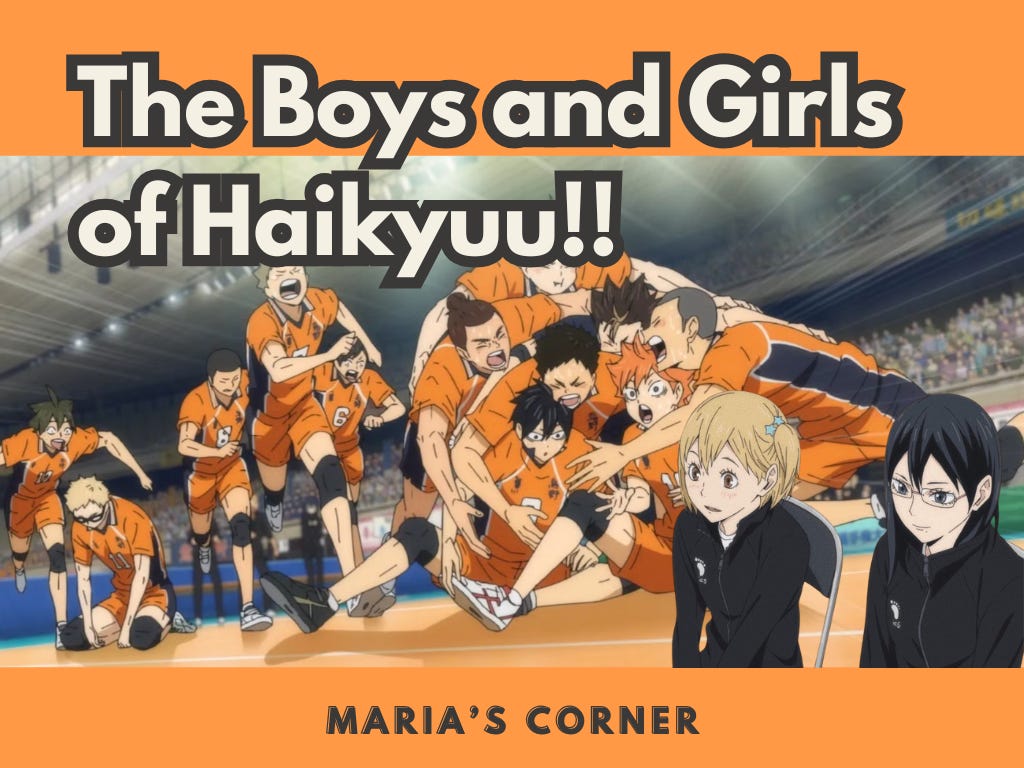
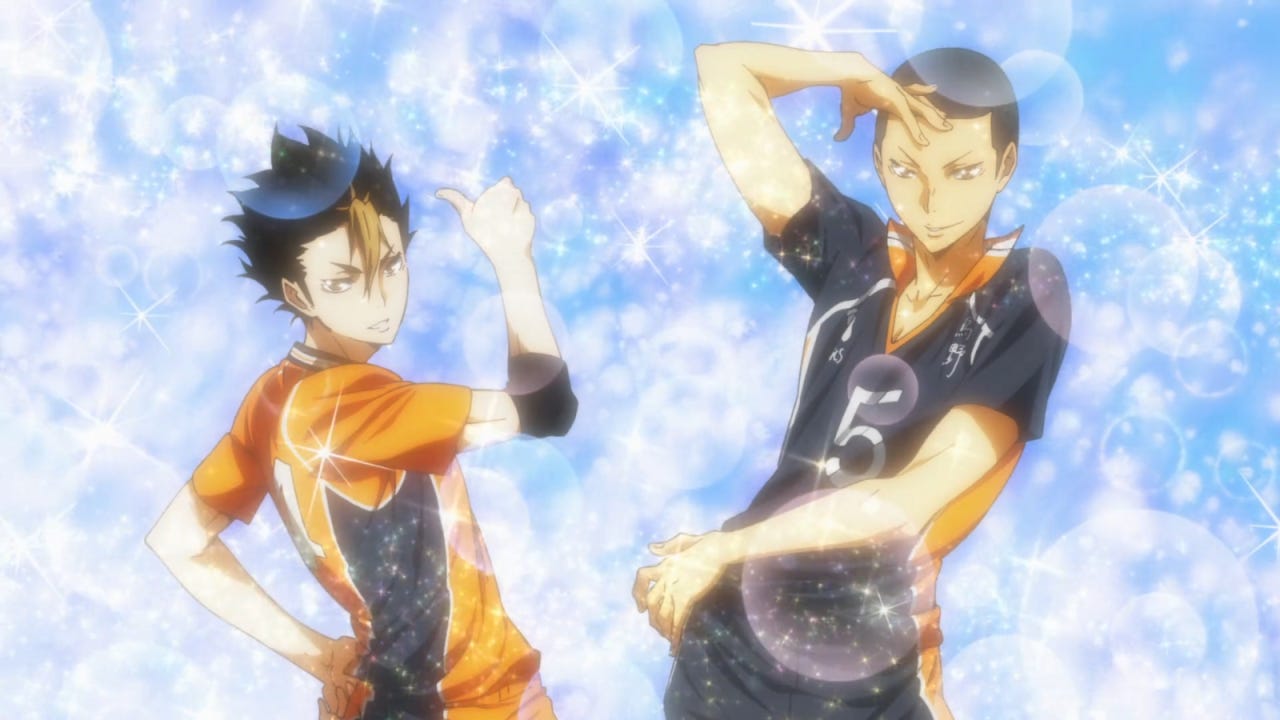
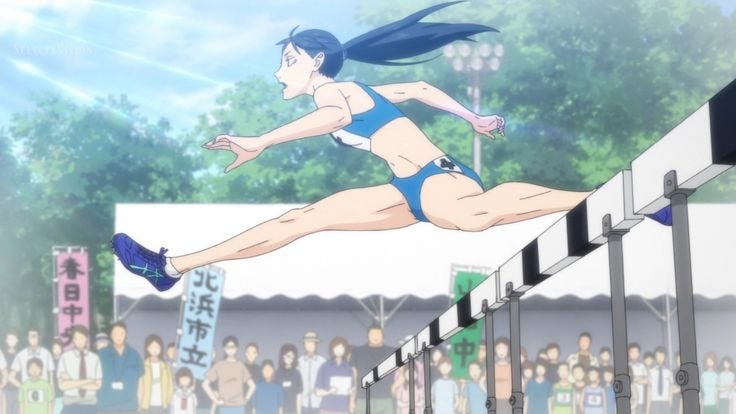
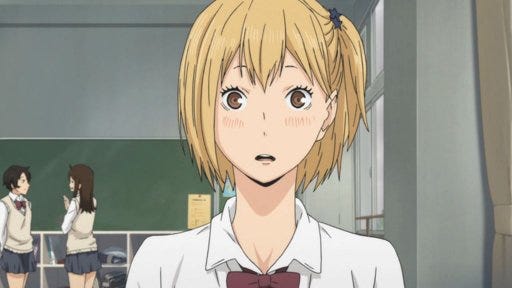
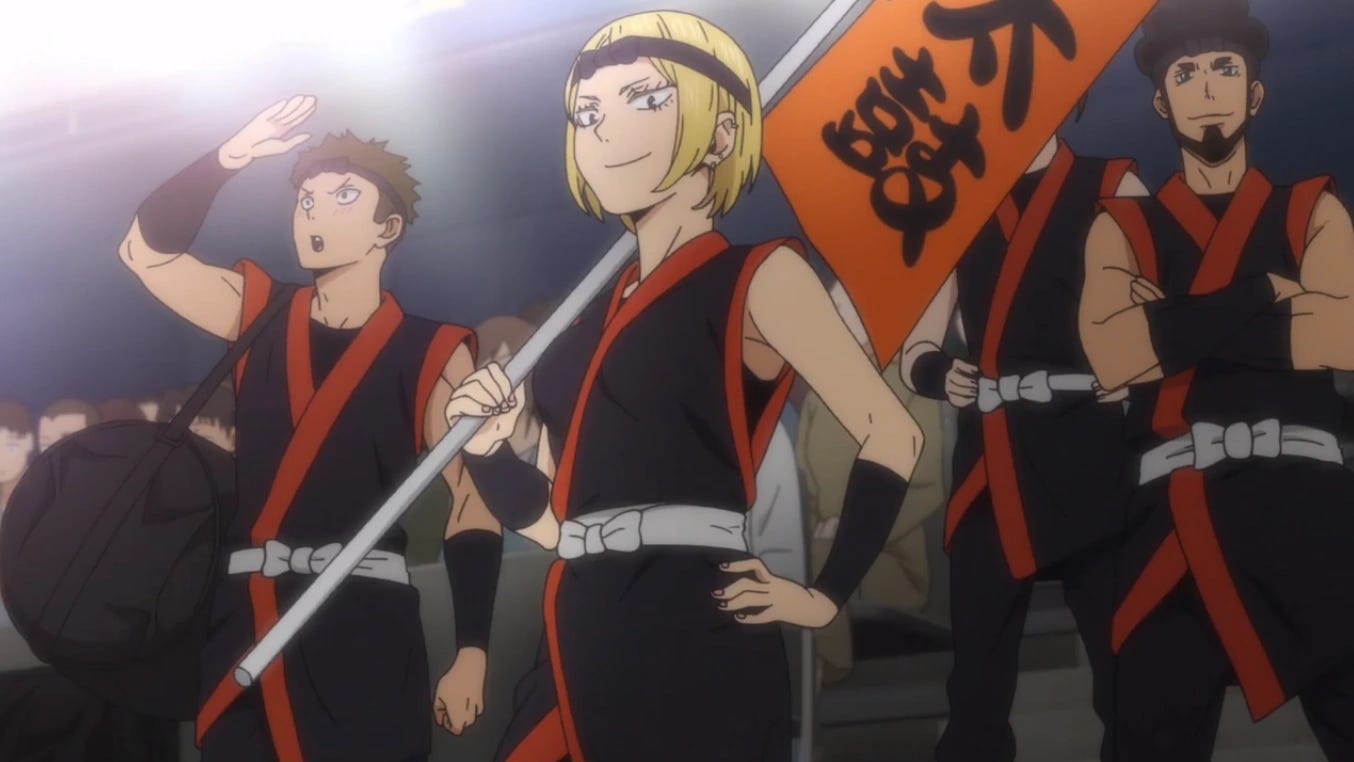
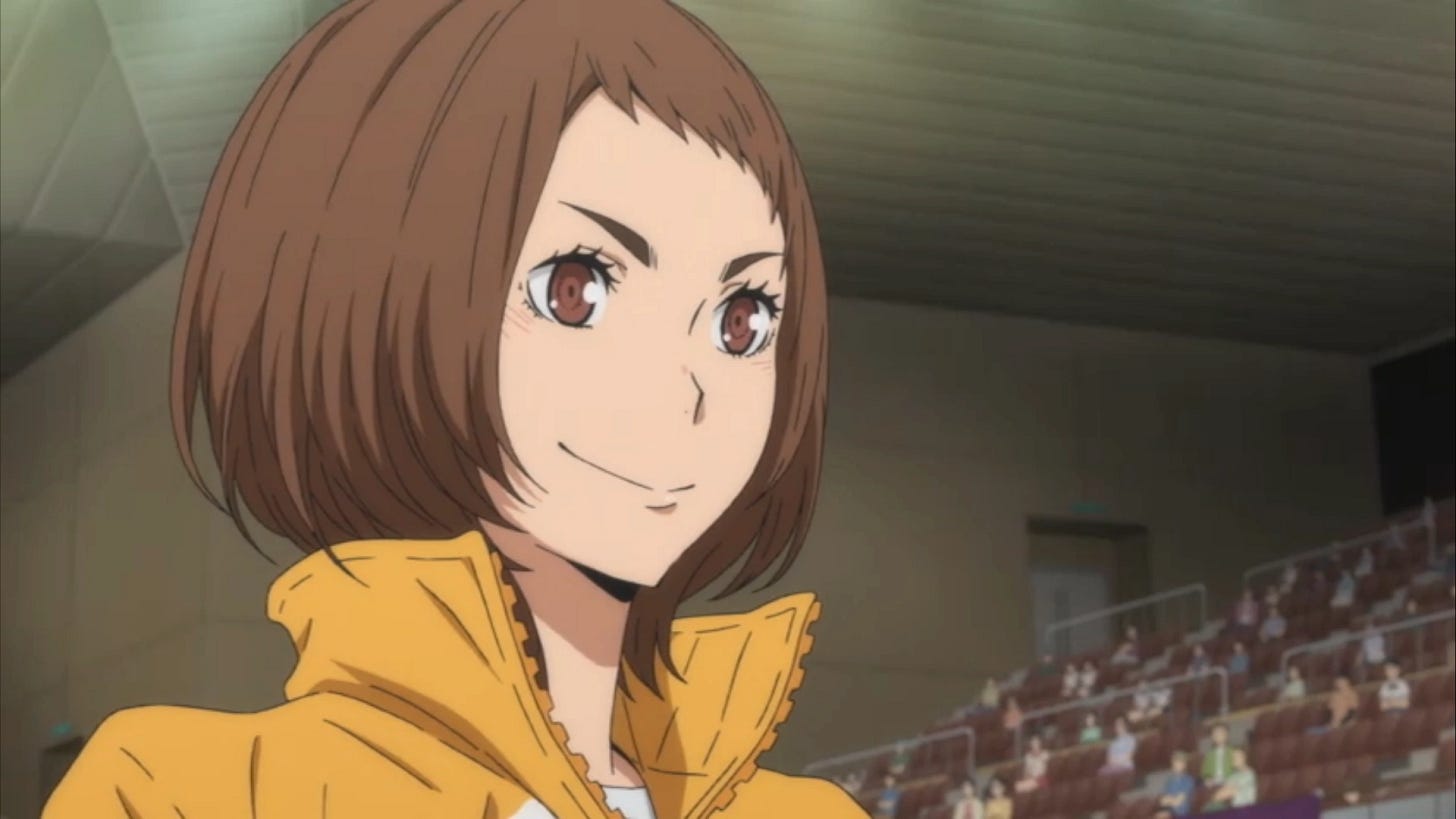
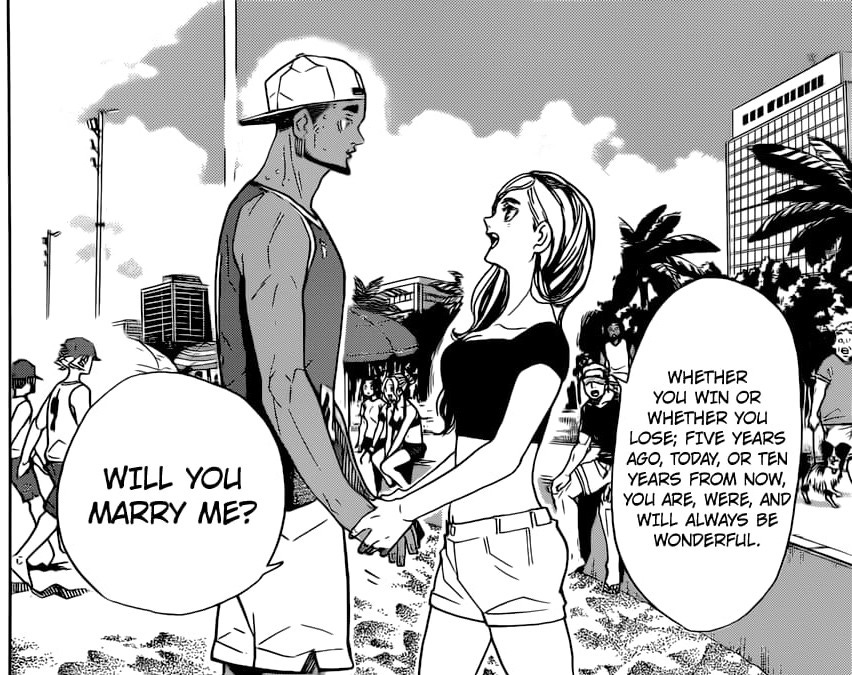
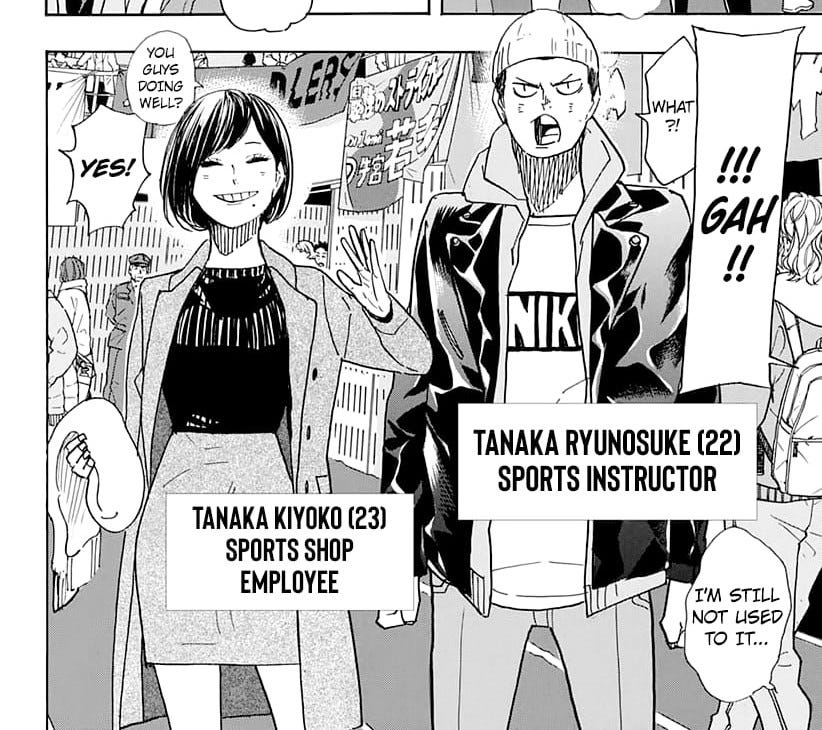
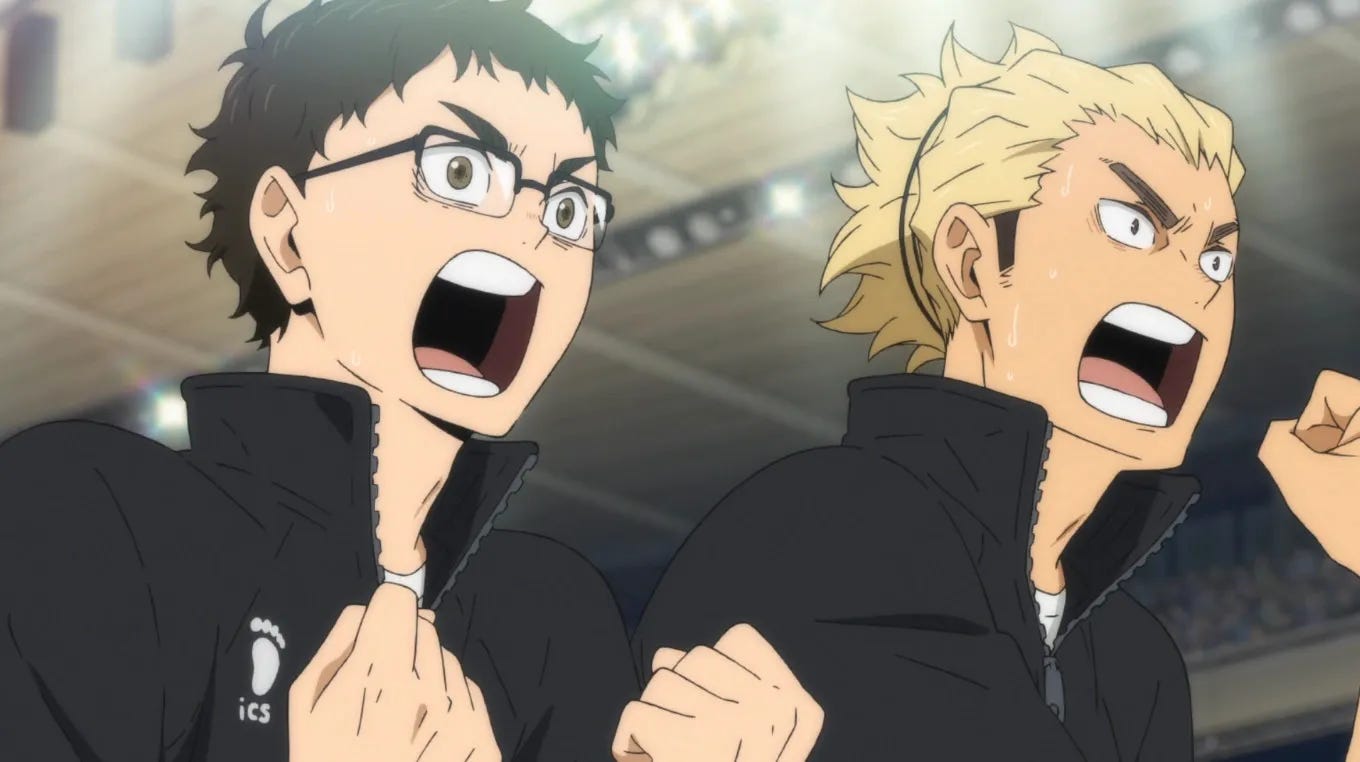
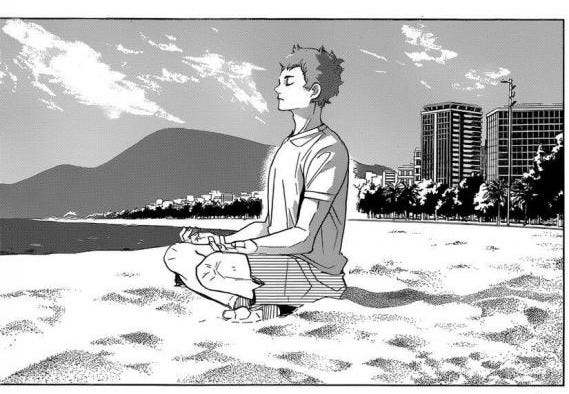
if u could see me reading this lol my nodding intensified with every word like yupYUP! this made me smile btw great analysis furudate is an amazing storyteller
I've been loving the anime, and this really highlighted and put into words some of the things that I've loved about it without realizing why!